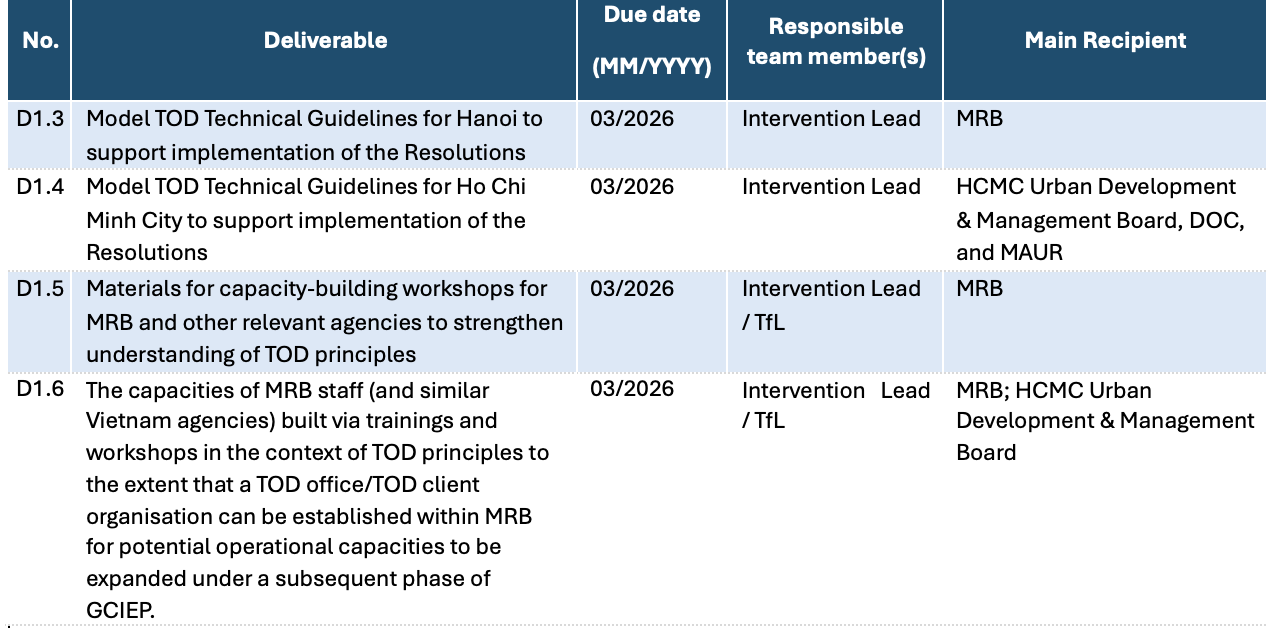
National Environment Expert
- On-site, Hybrid
- Hồ Chí Minh, Hồ Chí Minh, Vietnam
- Project Positions
Job description
GCIEP Overview
The Green Cities, Infrastructure and Energy Programme (GCIEP) is a demand-driven programme that drives sustainable green cities and climate-resilient infrastructure in lower-income countries. GCIEP is the core, demand-driven component of the UK's Green Cities and Infrastructure Centre of Expertise (GCI CoE). The programme supports the Foreign Commonwealth and Development Office (FCDO) to deliver the UK Government’s International Development Strategy through accelerating investment in, and delivery of, growth-enabling infrastructure and urban development that is responsible, reliable, inclusive, low-carbon and climate-resilient.
GCIEP is a high-ambition programme that targets transformational change in the enabling environment of its country partners that will deliver both immediate benefits and long-term development dividends for decades to come. The programme’s Theory of Change (ToC) targets the critical areas of support that will unlock these opportunities for countries – meeting these needs via Country Strategies that are tailored to the national and development context, and via innovative approaches that are drawn from UK expertise such as the whole systems approach to infrastructure design and resilience, and integrated urban planning and development. Key to the DNA of GCIEP is understanding how climate, gender, inclusion, investment and political economy analysis intersect and can be integral to its design and delivery. This gives the UK a clear and meaningful comparative advantage in this important and growing area of development practice.
Link to our website: https://ukgreencitiesandinfrastructure.org/
GCIEP Portfolio: Deep Offer Country
Country: Vietnam
Intervention name and code: DOC.VN02 – TOD and BIM
Workstreams / Work Package code: Workstreams 1, 2, 3, and 4
Locality: National
Expert Level: Senior Expert
Essential Skills / Qualifications required
Bachelor’s degree or higher in environmental science, environmental engineering, natural resources management, or a related field.
At least 10 years of relevant professional experience in environmental management, environmental impact assessment, or environmental policy development in Vietnam.
Strong understanding of Vietnamese environmental laws, regulations, and standards, as well as familiarity with international environmental best practices.
Familiarity with the environmental requirements and safeguards for IFI funded projects.
Proven track record in contributing to technical guidelines, operational manuals, and advisory reports.
Excellent analytical, problem-solving, and communication skills, with the ability to present technical concepts to both technical and non-technical audiences.
Experience in multi-stakeholder engagement, including working with government agencies, development partners, and the private sector.
Technical Expertise
Environmental impact assessment (EIA) and strategic environmental assessment (SEA).
Development and review of environmental management and monitoring plans.
Environmental aspects of infrastructure operation and maintenance, including mitigation measures and performance monitoring.
Integration of environmental considerations into planning, design, and operational guidelines.
Knowledge of climate change mitigation and adaptation measures relevant to infrastructure and urban development projects.
Familiarity with tools, methods, and frameworks for assessing environmental risks and sustainability performance.
This role reports to: TOD Core Team
Does this role involve line management responsibility? No
Start Date: 07/09/2025
End Date: 31/03/2026 – Potential extension subject to FCDO’s approval for GCIEP’s extension (4/2026-4/2029)
Full time or Part time role: Part-time (approx. 6-7 days/ month)
Total number of days: 50 days (max.)
Intervention summary
This intervention builds on GCIEP’s ongoing support to Hanoi (via the Hanoi Metropolitan Railway Management Board - MRB) and Ho Chi Minh City (via the Department of Construction - DOC). To date, GCIEP has helped strengthen the enabling environment for Transit-Oriented Development (TOD) by delivering city-specific Diagnostic Reports identifying TOD opportunities and barriers; Land Value Capture (LVC) recommendations for each city; a Strategy Framework on TOD planning, financing, and operations; and capacity-building workshops for Hanoi and HCMC.
This work has supported significant policy progress, including the issuance of national-level Resolution 188 (February 2025) and draft city-level TOD and LVC Resolutions in both Hanoi and HCMC (expected to be adopted in Q3 2025). It has also contributed to improved institutional understanding of TOD and Building Information Modelling (BIM) among key stakeholders, including MRB, DOC, MAUR, and others.
However, policy advancement alone is not sufficient. Local authorities, developers, and consultants still lack hands-on experience in delivering TOD projects and applying BIM in practice. Once policies are adopted, they must be translated into technical guidelines and effectively implemented. Institutional capacity remains a critical bottleneck. As the designated TOD and BIM delivery bodies, MRB in Hanoi and the Management Authority for Urban Railways (MAUR) in HCMC must urgently strengthen internal staffing, technical capabilities, and management processes. Organisational development must evolve in tandem with these responsibilities to ensure these agencies can internalise best practices and function as capable, long-term implementers.
This phase therefore shifts GCIEP’s focus from policy development to strengthening technical and commercial practices, beginning with Hanoi and HCMC. The objective is to build institutional and market capacity to implement TOD and unlock investment for metro-rail expansion using mechanisms such as Land Value Capture. In parallel, GCIEP will engage other cities — including Da Nang, Can Tho, Vinh, and Nha Trang — through knowledge-sharing activities to expand the intervention’s national impact.
Planned Workstreams and Activities
Workstream 1: TOD Technical Guidelines & Capacity Building
Activity 1: Continued support for the development and refinement of TOD-related Resolutions in Hanoi and HCMC (carried over from Phase 1 – The Intervention Lead will be supported by the Strategic Advisor to lead the day-to-day tasks of this activity).
Activity 2: Development of two city-specific TOD Technical Guidelines, providing step-by-step implementation guidance aligned with each city's policies and resolutions. The guidelines will be practical, context-specific, and designed to maximise social, environmental, and economic outcomes.
Activity 3: Delivery of capacity-building workshops in Hanoi and HCMC (to be extended to other cities), using a ‘learning by doing’ approach to introduce TOD principles and guide the design and implementation process.
Activity 4: Support the establishment and development of a TOD Office within MRB, with strategic input from Transport for London (TfL). While this task will be led by GCIEP, TfL will provide primary technical input. The Urban Development Management Authority in HCMC will also be engaged in knowledge transfer activities led by TfL
Workstream 2: TOD Site Selection Methodology
Development of a methodology for identifying station-level TOD areas along selected brownfield and greenfield metro lines in Hanoi. This workstream will be led by the GCIEP Alliance, with technical support from TfL and Crossrail International (CI).
Workstream 3: MRB Tender Information Portal
Support MRB in enhancing the transparency and effectiveness of its Tender Information Portal. This workstream will be led by CoST with GCIEP Alliance programme input.
Workstream 4: Support MRB with the establishment of a proposed “BIM Unit”
Review and recommend organisational design options, share international best practices, and deliver capacity building to support the establishment of a BIM unit within MRB. This workstream is to be led by CI with GCIEP Alliance programme input.
Brief Overview of the role / Objectives
As the National Environment Expert, you will prepare environment-related analyses, recommendations, and contributions to project reports. Your role will include providing technical inputs, regularly reporting progress to the Intervention Lead, and proactively identifying and flagging emerging risks.
Tasks and Key Duties
Key responsibilities include:
Contribute to the development of technical guidelines and lead the preparation of environment-related content, including the review and recommendations on operation and management, under the guidance and leadership of the Intervention Lead and Deputy Intervention Lead.
Coordinating with the Global CN&E experts and delivery partners to ensure environment-related considerations are integrated into recommendations in workstreams 2, 3, and 4; preparation inputs and review support on the relevant reports under these workstreams
Participating in team meetings and ensuring the regular and timely report to the TOD Management team.
Inputting to the Programme’s quarterly and annual progress review reports on environment-related elements when required.
Participate in and provide technical inputs during relevant technical meetings with stakeholders and team members.
Coordinate with other experts in the team to clarify issues and/or build consensus in technical meetings, as requested by the Intervention Lead or Deputy Intervention Lead.
Prepare written deliverables and other technical outputs as requested by the Intervention Lead or Deputy Intervention Lead.
Present team outputs to stakeholders when requested by the Intervention Lead or Deputy Intervention Lead.
Undertaking other tasks as assigned by the Intervention Lead and Deputy Intervention Lead to support successful project delivery
Specific Deliverables
The National Environment Expert will contribute main inputs to the following deliverables under workstream 1, progress review reports, and review support to other workstreams as indicated in the ToR

or
All done!
Your application has been successfully submitted!
